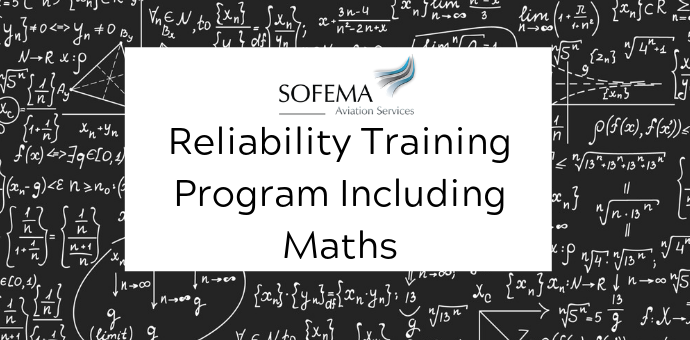*****Continuing Airworthiness – Reliability Training Program
including Maths – 5 Day Program******
Venue: SAS Training Academy, Sofia, Bulgaria
This is an extensive EASA Compliant Reliability Program Training Course covering every aspect of the Reliability Program Basics through to Advanced Reliability Mathematics.
Consisting of 5 Days of intensive interactive instructor-led classroom tuition with 2 separate courses, which you can combine for additional saving’s
These courses provide the delegate with a deep understanding of the principles and methodology required to deliver an effective reliability program fully compliant with EASA regulations.
The Sofema Reliability training courses have been developed with practicality in mind. Our course’s combination of theory and related mathematical principles has been designed to demonstrate a logical process to the delegates that promote best maintenance practices whilst maintaining continued oversight of aircraft maintenance programme effectiveness.
Delegates will consider the challenges and issues faced with the program management and effective interpretation of data and have the necessary knowledge to fully engage with their organisation’s program or indeed to develop a new program.
About Sofema Reliability Training
Our courses are developed with several constituents in mind:
- Effective Reliability Programme Development & Implementation
- An in-depth understanding of mathematics.
- How to introduce meaningful reliability analysis without having to expend both time and cost of using 100% of the data.
In simple terms, reliability (like safety risk management), is a function of probability, and we make a point of also demonstrating the reliability contribution to overall safety management.
Maximise your Saving
Take both courses for the full program and combine with the Early Bird Discount for an Amazing 1245 USD (approx. 1110 Euros for a Full Reliability Training Program)
See here for an overview of the extensive training program
Day 1
– Abbreviations & Terms
– Aircraft Maintenance Program Introduction
– General Introduction to Aircraft Reliability Systems
– Measures of Reliability
– Part M Subpart C Regulatory Driven Reliability Requirements
– Maintenance Planning Engineering Function
– The Benefits of an Effective Reliability Program
– Performance Standards and Alert Levels
– Operator Responsibilities
Day 2
– Structure and Development of the Reliability Program
– Information Sources & Data Acquisition
– Reliability Analysis and Interpretation
– Indicators of Structural Reliability
– Indicators of Aircraft Components Reliability
– Presenting Reliability Data
– Engine Reliability Program (Engine Condition Trend Monitoring (ECTM))
– Effective use of reliability data to support the management of Continuing Airworthiness
– Understanding Strip reports and working with workshop data
Day 3
– Reliability Programme Administration
– Manage Competencies within a Reliability Framework
– Developing Reliability Procedures
– Reliability Auditing
– Corrective Actions
– Reliability Driven Optimization
– Managing External Information Sources
– Pooling Arrangements
– Evaluation, Review and Changes
– Managing check findings in the context of reliability
– Measuring the Effectiveness of the Maintenance Planning Process
Day 4 or Day 1 – The Mathematics behind Aircraft Reliability
– Probability Basics
– Descriptive Statistics
– Charts & Graphs
– Tabular Displays
– Probability Laws
– Introduction to Sample Theory
– The basics of distribution
– Discrete (Poisson Distribution Overview)
– Continuous Distribution
– Normal Distribution
– Standard Normal
– Estimation Theory
– Proportions
– Mean Scores
– Data Collection
– Sample Planning
Day 5 or Day 2 – The Mathematics behind Aircraft Reliability
– Calculating Arithmetic Mean
– Calculating Standard Deviation – Population & Sample
– Setting Standard Deviation (68% 95% and 99%)
– Use of Mean & Standard Deviation to set the UCL (Mean + 1SD, Mean + 2SD, etc..)
– Identifying & Managing False Alerts
– Determining Confidence levels, intervals, etc.
– Rate of Failure;
– Mean Time to Failure (MTTF);
– Mean Time Between Failure (MTBF);
– Mean Time Between Unscheduled Removals (MTBUR)
– Mean Time To Removal (MTTR)
– Chance of Failure
– Usefulness
For more details please see here or email office@sassofia.com





